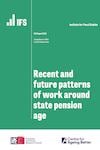Sign up to receive the latest news, research, policy updates and events about ageing.
SubscribeContact our team for more information
Contact usThere have been dramatic changes in the patterns of work among people in their 50s and 60s over the last 50 years. The gradual increases in employment since the mid-1990s are generally welcome. A longer working life boosts household incomes, as people are reliant on their wages and salaries for longer (as opposed to state benefits), they have longer to accumulate private pension wealth, and fewer years in retirement to draw upon their private pension resources.
There have been changes not only in the number of people in work, but also in the types of work they have been undertaking, with particularly large rises in full-time work for women.
This report brings together new evidence on these issues to examine the recent trends in, and prospects for, the labour market for people in their 50s and 60s. This research draws upon evidence from a two-year programme of work conducted in partnership between the Institute for Fiscal Studies and the Centre for Ageing Better to understand the changing patterns of work for older workers. There's also new evidence from analysis of recent microdata on labour market outcomes and expectations to help provide an assessment of the situation facing older workers in coming years.

Sign up to receive the latest news, research, policy updates and events about ageing.
SubscribeContact our team for more information
Contact us